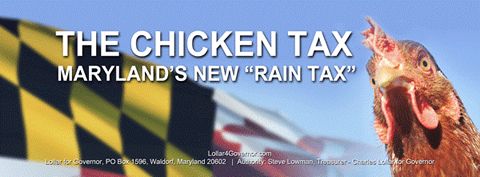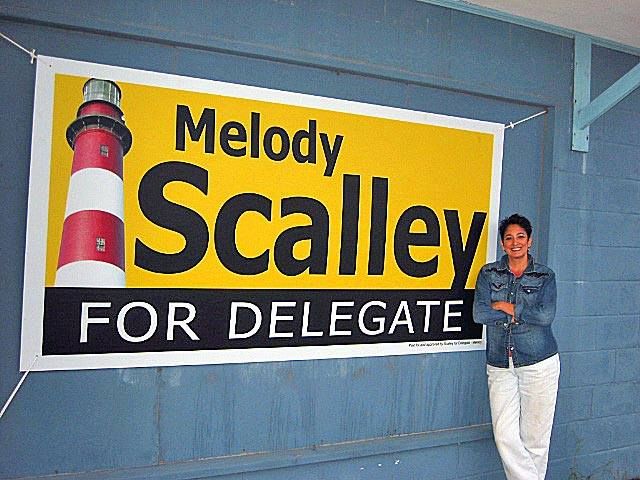 You wouldn’t necessarily think of him as the farmer’s candidate, but Charles Lollar has at least paid a little bit of attention to how environmental factors affect one of Maryland’s top industries. Recall that he spoke at length about the Hudson case in one of his initial campaign stops, and it may not necessarily surprise you that he’s now making hay out of what’s he dubbing the “chicken tax.”
You wouldn’t necessarily think of him as the farmer’s candidate, but Charles Lollar has at least paid a little bit of attention to how environmental factors affect one of Maryland’s top industries. Recall that he spoke at length about the Hudson case in one of his initial campaign stops, and it may not necessarily surprise you that he’s now making hay out of what’s he dubbing the “chicken tax.”
The “Chicken Tax” is another “Rain Tax” moment in Maryland history. Farmers in Maryland should be outraged. Agriculture is the number one economic industry in Maryland. It accounts for $2.3 billion in gross receipts to the economy annually and generates approximately 46,000 jobs. More than half of these jobs are on the Eastern Shore. Why are legislators willing to risk all that?
We need a balanced approach to solving environmental issues in Maryland. Keeping the Bay clean is a regional problem that involves more than controlling agricultural run off from Maryland farms. Sediment from adjacent states, like Pennsylvania, contribute to the pollution. Leadership in Annapolis needs to craft a regional solution to this problem that requires all states that pollute the Bay to “pay their fair share” to keep it clean. We must not allow legislators in Annapolis to “hurt Maryland first” by bankrupting hard-working farmers with a “Chicken Tax” and putting the future of Maryland’s number one economic industry at risk.
Given Lollar’s propensity for shrill populism, I took the liberty of reading the bill in question, Senate Bill 725. (The same bill is in the House of Delegates as House Bill 905, a common Maryland practice.) The Senate bill’s lead sponsor is Richard Madaleno, a Montgomery County senator whose experience with chicken is probably that of seeing it at Whole Foods. (He seems the vegetarian type.)
Basically the bill as proposed, called the Poultry Fair Share Act (PFSA), tries to “achieve” two things: raise money from poultry processors like Perdue, Mountaire, Tyson, etc. at five cents per bird and establish a bankroll to “fund cover crop activities on agricultural lands upon which chicken manure has been applied as fertilizer.” The secondary purpose of the bill is to increase the share of money going into an existing state fund to reimburse owners of failing septic systems who have to replace them with a system with enhanced nitrogen removal – currently that fund shares its proceeds with the cover crop program on a 60/40 basis, with the cover crops getting the 40% share.
Needless to say the local producers are feeling a little put upon, as would anyone subject to a bill arbitrarily deeming that it pay a “fair share.” Madaleno is probably upset because his county has to pay the aforementioned “rain tax” but no Eastern Shore county yet has to (although certain muncipalities in the region already collect such a tax.) Prominently featured on the webpage of the Delmarva Poultry Industry homepage is a series of questions about the PFSA.
So my question is simple, and it applies to any candidate, including Lollar. How many of you will put your money where your mouth is and go testify against the Senate bill when it comes to a hearing on Tuesday, February 25th at 1 p.m.? Certainly these candidates are willing to put themselves out for gun rights and stand against taxation in general, but who is going to face down the environmental lobby in this state and politely (or better yet, impolitely) tell them to do the anatomically impossible and go f–k themselves?
Writing a press release is one thing, but we need activists. Personally I’m tired of seeing the agricultural industry in Maryland – no, wait, the entire rural slice of the state in general, whether it be farmer, resident, or small business – be the featured whipping boy for groups which would just as soon see the non-urban portions of the state revert to their once-wild condition. Yes, that means you, Waterkeepers Alliance, Food and Water Watch, and even certain members of the Chesapeake Bay Foundation. I’ve only been here a decade, but I spent my teenage years in a rural area and I think we all got along just fine without you because – as they often note – farmers are the original environmentalists. We might not have liked it a whole lot when the wind blew the perfume of the pig farm down the road our way, but it was a small inconvenience for the rural living my parents desired.
I happen to think we can have it all – a great quality of life, economic growth and the jobs it creates, and water quality suitable for the recreational and aquacultural purposes we demand from Chesapeake Bay – without these environmentalists coming in and mucking up the works with overregulation and harsh taxation. Hopefully we can count on all four GOP gubernatorial candidates to stick up for the farmer in this fight.


 A longtime supporter and fan of this site is once again trying to parlay her talents and activism into a seat in the Virginia House of Delegates.
A longtime supporter and fan of this site is once again trying to parlay her talents and activism into a seat in the Virginia House of Delegates.